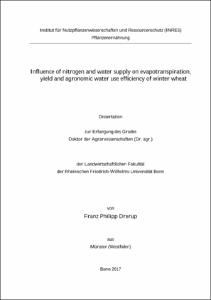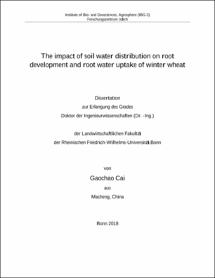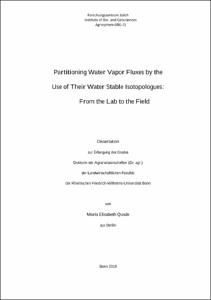The impacts of household water quality testing and information on safe water behaviorsEvidence from a randomized experiment in Ghana

The impacts of household water quality testing and information on safe water behaviors
Evidence from a randomized experiment in Ghana

| dc.contributor.author | Okyere, Charles Yaw | |
| dc.contributor.author | Pangaribowo, Evita Hanie | |
| dc.contributor.author | Asante, Felix Ankomah | |
| dc.contributor.author | von Braun, Joachim | |
| dc.date.accessioned | 2024-09-12T07:46:37Z | |
| dc.date.available | 2024-09-12T07:46:37Z | |
| dc.date.issued | 03.2017 | |
| dc.identifier.uri | https://hdl.handle.net/20.500.11811/12123 | |
| dc.description.abstract | Households in developing countries face an enormous set of health risks from using contaminated water sources. In 2014, a group of 512 households relying on unimproved water, sanitation and hygiene practices in the Greater Accra region of Ghana were randomly selected to participate in the intervention on water quality self-testing and to receive water quality improvement messages (information). The treatment group was separated into two groups: (1) a school children intervention group and (2) an adult household members intervention group, to identify the role of intra-household decision making or resource allocation in the delivery of water quality information. The comparison group neither participated in the water quality self-testing nor received information. The impacts of the experiment are estimated using intention-to-treat (ITT), instrumental variable (IV) and differences-in-differences (DiD) estimators. Participation rate, which is used as a proxy for uptake, is higher among the schoolchildren intervention group in comparison to the adult intervention group. The results show that the household water quality testing and information experiment increase the choice of improved water sources and other safe water behaviors. The study implies that household water quality testing and information could be used as “social marketing” strategy in achieving safe water behaviors. The school children intervention group is more effective in the delivery of water quality information, thereby making a strong case of using school children as “agents of change” in improving safe water behaviors. The study also finds limited evidence of gender differentiated impacts based on the gender of the participants, especially in terms of improved water source choices. The findings have implications on the Sustainable Development Goals (SDGs), particularly on improvement in safe water behaviors and microbial analysis of water quality by providing practical experiences from resource poor settings. | en |
| dc.format.extent | 63 | |
| dc.language.iso | eng | |
| dc.relation.ispartofseries | ZEF-Discussion Papers on Development Policy ; 234 | |
| dc.rights | In Copyright | |
| dc.rights.uri | http://rightsstatements.org/vocab/InC/1.0/ | |
| dc.subject | Information | |
| dc.subject | Agents of Change | |
| dc.subject | Water Quality | |
| dc.subject | Health Behavior | |
| dc.subject | Randomized Evaluation | |
| dc.subject | Water Storage | |
| dc.subject | Water Transport | |
| dc.subject | Water Treatment | |
| dc.subject | Africa | |
| dc.subject | Ghana | |
| dc.subject.ddc | 300 Sozialwissenschaften, Soziologie, Anthropologie | |
| dc.subject.ddc | 320 Politik | |
| dc.subject.ddc | 330 Wirtschaft | |
| dc.title | The impacts of household water quality testing and information on safe water behaviors | |
| dc.title.alternative | Evidence from a randomized experiment in Ghana | |
| dc.type | Arbeitspapier | |
| dc.publisher.name | Center for Development Research (ZEF), University of Bonn | |
| dc.publisher.location | Bonn | |
| dc.rights.accessRights | openAccess | |
| dc.relation.eissn | 1436-9931 | |
| dc.relation.url | https://www.zef.de/fileadmin/user_upload/zef_dp_234.pdf | |
| ulbbn.pubtype | Zweitveröffentlichung | |
| dc.version | publishedVersion |







